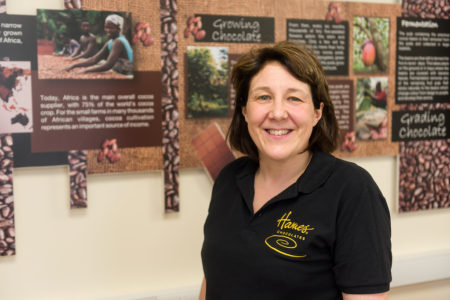Casa Luker joins Colombian government in cocoa production initiative

Colombian confectionery company Casa Luker has joined with the country’s government and National Cocoa Federation in pledging to produce deforestation-free and ‘peace-friendly’ cocoa by 2020.
The commitment, which is believed to be the first of its kind in Latin America, will be supported by the World Resources Institute (WRI) and the Sustainable Trade Initiative (IDH).
Colombia joined the Cocoa and Forests Initiative, a global effort to ensure deforestation-free cocoa. The Governments of Ghana and Côte d’Ivoire, responsible for 60% of the world’s cocoa, were the first two governments to sign and implement the agreement in 2017.
The scheme, which will be called the ‘Cocoa, Forests and Peace Initiative’, in honour of cocoa’s role in advancing the historic peace process by providing rural employment to farmers and communities previously involved in the conflict.
The Colombian cocoa sector is said to be growing rapidly, with the crop identified as a priority for Colombian agricultural growth, both for domestic consumption and international export. The bulk of the country’s cocoa production has the characteristics of ‘Fino de Aroma’ cocoa, a classification much-prized in the international market.
“Colombia is proud of the quality of the cocoa it produces, as well as its contribution to economic growth, rural employment, avoided deforestation and restoration of degraded land,” said Juan Guillermo Zuluaga, Colombia’s minister of agriculture and rural Development. “In a market characterised by a growing interest in zero-deforestation cocoa, with a positive story to tell about forests and peace, we hope Colombia’s signing up to the Cocoa and Forests Initiative will encourage greater interest and investment in the Colombian cocoa supply chain.”
Colombia’s rates of deforestation have reportedly increased rapidly since the conclusion of the peace process, as remote areas of the countryside – once off-limits – have seen rapid agricultural and livestock expansion, land speculation and infrastructure development.
Recent data from Global Forest Watch and the National Meteorological Institute (IDEAM) show Colombia saw a 46 percent increase in tree cover loss in 2017, which was double the average loss from 2001-’15, but the country is taking significant steps to stop this trend.
The government cancelled a major highway project connecting Venezuela and Ecuador, destroyed several illegal roads, and launched the “Green Belt” initiative to protect and restore a 9.2-million-hectare forest corridor. To date, cocoa has not been a significant driver of deforestation in Colombia, and the Initiative is intended to ensure that this continues.
Colombia views cocoa as a strategic crop with which to close the forest frontier and restore degraded agricultural lands through agroforestry and silvopastoral systems comprising cocoa, livestock and trees.
In addition to the new initiative, the country has pledged to restore 1 million hectares of degraded land in its National Development Plan and under Initiative 20×20, a regional effort to change the dynamics of land degradation in Latin America and the Caribbean.
“The Government of Colombia is doing its utmost to reduce the high rates of deforestation which have ensued since the peace process. With the support of the international community, and responsible businesses, my country is making strong progress towards delivering on its commitments to put an end to deforestation. Cocoa is a critical part of this effort”, said Luis Gilberto Murillo, the Colombian minister of environment and Sustainable Development.
“Across the country, I have seen wonderful examples of cocoa taking pressure off natural forests, and instead making a real contribution to the restoration of ecological health and vitality to degraded landscapes. It is therefore with great pleasure that I sign this Agreement.”
The Cocoa and Forests Initiative was launched in 2017, in an effort led by the World Cocoa Foundation, the Sustainable Trade Initiative, and The Prince’s International Sustainability Unit. It has coordinated closely with several organizations, including the World Resources Institute, which has provided support on deforestation monitoring in West Africa through its Global Forest Watch Pro platform and Forest Atlas technology.
Colombia’s joining came about as a result of the country’s engagement in the Food and Land Use Coalition, a public-private collaborative effort to develop strategies for sustainable rural economic development.
Richard Scobey, president of the World Cocoa Foundation, said: “WCF congratulates the Colombian government and other stakeholders on their commitment to end cocoa-related deforestation in Colombia. We are delighted to support this initiative and, along with our members in the global chocolate and cocoa industry, will remain a trusted partner to ensure the sustainability of cocoa, the health of the planet, and the prosperity of cocoa farmers around the world.”
Colombia has strong ambitions to grow its cocoa export market, with cocoa identified as one of the country’s priority crops in its ‘Colombia Siembra’ agricultural growth strategy, as well as its engagement in the World Economic Forum’s New Vision for Agriculture (whose secretariat is hosted by The Sustainable Trade Initiative – IDH – in Colombia). The lead signing company, Casa Luker, is responsible for purchasing the majority of Colombia’s national cocoa production.
Camilo Romero, CEO, Casa Luker Cacao, and member of the World Cocoa Foundation, said: “Casa Luker has a proud 100-year history of cocoa production in Colombia, with a long-standing commitment to strong environmental management and social inclusion in its cocoa supply chain. We wholeheartedly endorse the principles of the Cocoa and Forests Initiative, and look forward to contributing fully to its successful implementation in the years ahead.”



